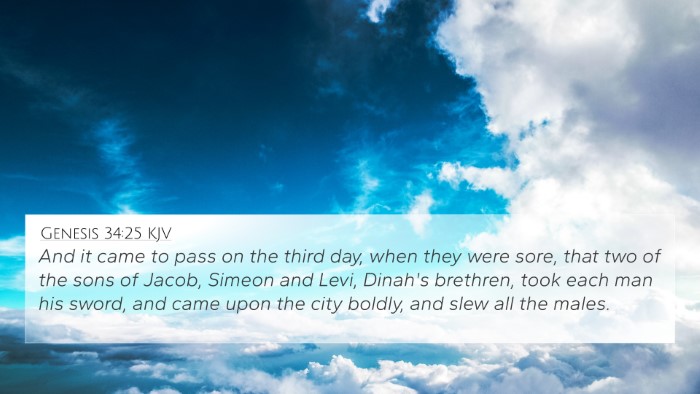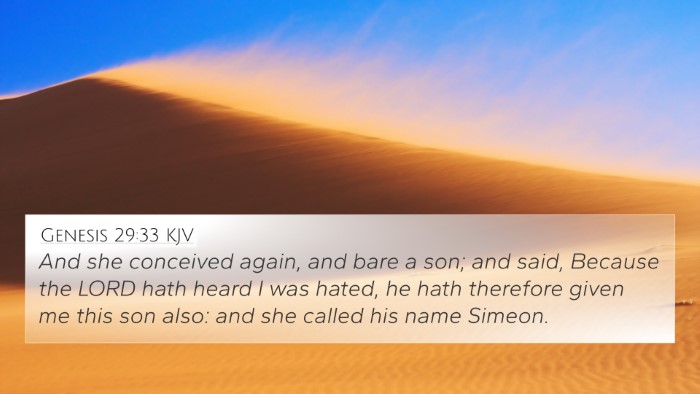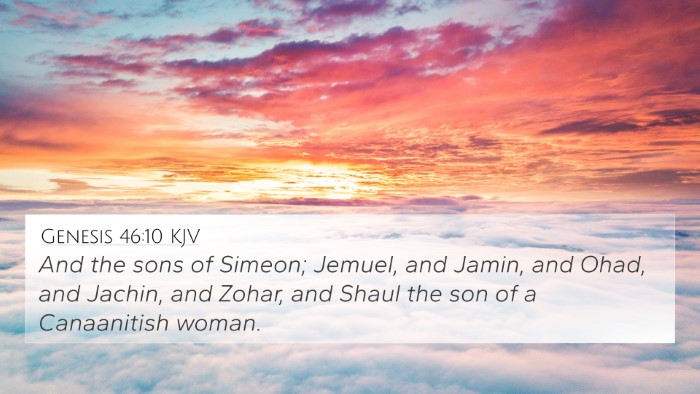Meaning and Interpretation of Genesis 49:5
Genesis 49:5 states:
“Simeon and Levi are brothers; weapons of violence are their swords.”
Summary of Insights from Public Domain Commentaries
This verse is part of Jacob's final blessings to his sons before his death, where he presents a prophetic insight concerning the tribes that will descend from them. The commentary highlights the complex nature of Jacob's words, especially regarding Simeon and Levi.
Matthew Henry's Commentary
Matthew Henry explains that Jacob's reference to Simeon and Levi as brothers emphasizes their close relationship, both in birth and in actions. Their “weapons of violence” are reminiscent of their infamous act of vengeance against Shechem for the rape of their sister Dinah (Genesis 34). This violent response is noted as both a weakness and a flaw that would shape the character of their tribes. Henry suggests that this premonitory statement foreshadows the division and strife that would characterize the descendants of these brothers.
Albert Barnes' Notes
Barnes adds that the weapons mentioned symbolize not only physical warfare but also moral corruption. He points to the idea that the violent nature of Simeon and Levi led to consequences for their descendants, implying a lack of peace within their tribes. The curse of Jacob carries considerable weight, indicating that while God may use even flawed personalities, the outcomes of violence are serious and far-reaching.
Adam Clarke's Commentary
Clarke further elaborates on the behavioral traits inherited by the tribes of Simeon and Levi. He notes that the fierce disposition of these brothers can be seen throughout their tribal histories, particularly in the violent actions of their descendants. The implication is that Jacob's words serve as not just a warning but also as a divine commentary on their lives moving forward, linking their actions directly to the consequences they would face as a people.
Thematic Connections
This verse highlights various themes within the Bible, including:
- Brotherhood and Conflict: The relationship between Simeon and Levi is indicative of familial ties that can lead to conflict.
- Consequences of Sin: Their violent act is a reminder of the repercussions that come from moral failings.
- Divine Justice: The curse serves as a mechanism of justice in the unfolding narrative of the Israelite tribes.
- Prophetic Warnings: Jacob's statements are prophetic, serving as a warning of future strife within these tribes.
Bible Verse Cross-References
Genesis 49:5 connects with several other Bible verses that illustrate related themes:
- Genesis 34:25-26: The violent actions of Simeon and Levi in response to the injustice toward Dinah.
- Exodus 32:26-28: The Levites' later actions during the idolatry incident at Mount Sinai, where they took up swords against their brethren.
- Leviticus 25:2: Discussing the Levitical cities, highlighting the role of Levi in priestly service, contrasting their violent past.
- Deuteronomy 33:8-11: Moses’ blessings to Levi, showing a transformation from their past actions to a responsibility before God.
- Psalm 78:67-68: A reference to God rejecting the tribe of Ephraim in favor of Judah, noting the continuing consequences of Levi’s actions.
- Hebrews 7:14: The significance of Jesus coming from the tribe of Judah, emphasizing the shift from Levi's violent history to Christ's peace.
- James 1:20: A New Testament perspective on the futility of man’s anger, which aligns with Simeon and Levi's violent nature.
The Importance of Cross-Referencing Bible Texts
Engaging in cross-referencing Bible texts enhances our understanding of scripture. Utilizing tools such as a Bible concordance can provide resources for deeper study, allowing us to see the connections between the Old and New Testament. Cross-referencing helps in identifying biblical parallels, providing rich insights into thematic ties between various scriptures.
Conclusion
Genesis 49:5 serves as a poignant reminder of the implications of violence and the legacy it leaves. By examining the connections between this verse and others, we can appreciate the complexity of the biblical narrative and how it interweaves themes of sin, justice, and redemption throughout the scriptures.






